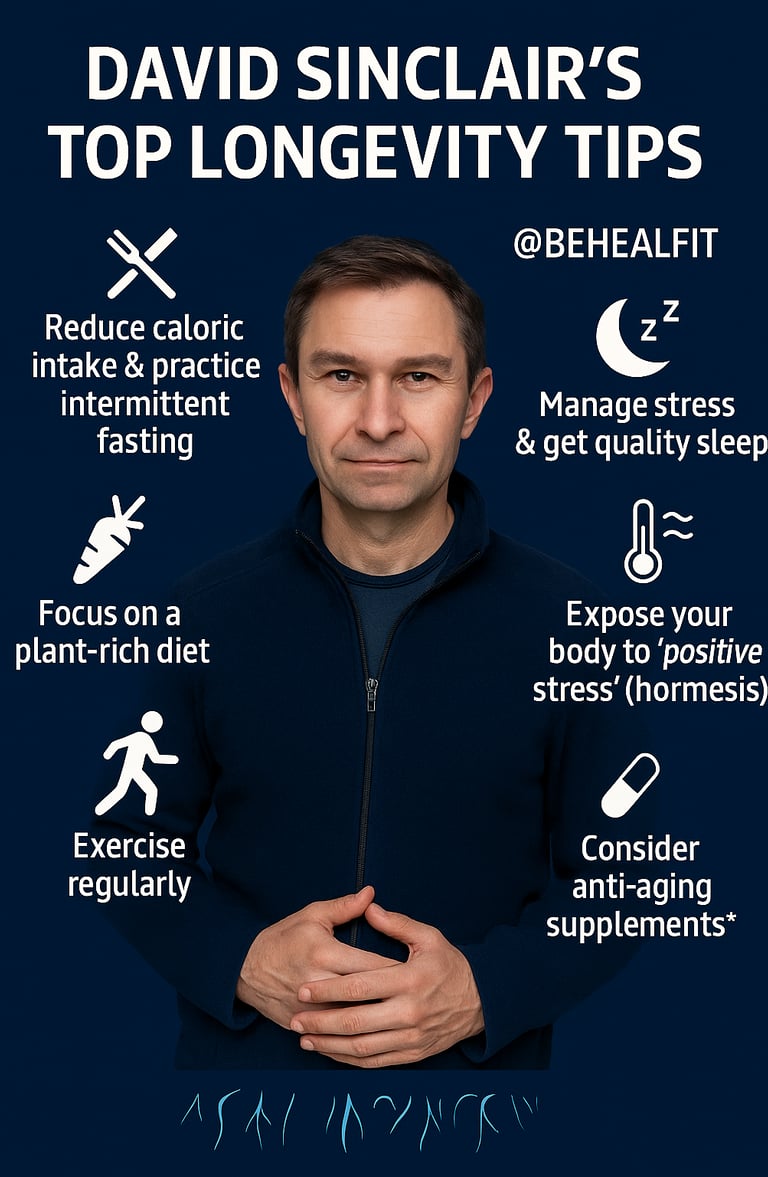David Sinclair’s Advice on How to Extend Your Lifespan
Discover Harvard researcher David Sinclair’s science-based advice on slowing aging and extending life. Learn his tips on diet, exercise, stress, and longevity.
HEALTHBLOG-LISTWELLNESS
Narcisse Bosso
8/29/20252 min read


In Brief
David Sinclair, a Harvard professor and world-renowned expert on aging biology, believes that aging is a modifiable process. His research suggests it’s possible to slow down and even partially reverse aspects of aging through specific lifestyle habits. His approach combines nutrition, exercise, stress management, and in some cases supplements, to extend not just lifespan, but healthspan.
Table of Contents
Who Is David Sinclair?
Key Principles to Slow Aging
Reduce Caloric Intake and Practice Intermittent Fasting
Focus on a Plant-Rich Diet
Exercise Regularly
Manage Stress and Prioritize Quality Sleep
Use “Positive Stress” (Hormesis)
Supplements and Molecules Sinclair Studies
Long-Term Benefits
FAQ
Conclusion
Who Is David Sinclair?
David Sinclair is an Australian biologist and professor of genetics at Harvard Medical School. Author of the best-selling book Lifespan: Why We Age – and Why We Don’t Have To, he is known for his research on longevity genes (sirtuins) and molecules such as resveratrol and NMN.
👉 Also read: Japanese Habits That Promote Longevity.
Key Principles to Slow Aging
1. Reduce Caloric Intake and Practice Intermittent Fasting
According to Sinclair, eating less often activates longevity genes and improves cellular repair. Intermittent fasting or mild caloric restriction are strongly recommended.
2. Focus on a Plant-Rich Diet
A diet rich in vegetables, fruits, legumes, and whole foods supports metabolic health and reduces chronic inflammation.
3. Exercise Regularly
Physical activity stimulates mitochondria and boosts longevity. Sinclair recommends a combination of cardio (running, cycling) and strength training for optimal results.
4. Manage Stress and Prioritize Quality Sleep
Good sleep regulates hormones, supports cellular repair, and protects the brain. Mindfulness practices like meditation and breathing exercises lower oxidative stress.
5. Use “Positive Stress” (Hormesis)
Exposing the body to mild stress, such as cold (cold showers, cryotherapy) or heat (sauna), activates repair mechanisms and builds resilience.
6. Supplements and Molecules Sinclair Studies
Sinclair has mentioned taking supplements like metformin (medically supervised), NMN (nicotinamide mononucleotide), resveratrol, and vitamin D. However, he stresses that these should always be monitored by healthcare professionals.
👉 Learn more: Vitamin D is toxic.
Long-Term Benefits
Reduced risk of chronic diseases (diabetes, cardiovascular disease).
Better energy and vitality with age.
Protection of memory and cognitive functions.
Increased healthspan (living longer in good health).
FAQ
1. Are David Sinclair’s recommendations backed by science?
Yes. Most of his advice (fasting, exercise, plant-based diet) is supported by strong evidence. Some molecules like NMN are still under study.
2. Can I apply his advice without supplements?
Absolutely. The foundation is fasting, diet, exercise, and stress management.
3. Is it suitable for everyone?
Yes, but adjustments should be made depending on age and health. Always seek medical advice for supplements.
4. Is intermittent fasting mandatory?
It is highly recommended, but a balanced diet alone still supports healthy aging.
5. Does Sinclair believe aging can be stopped?
He suggests that aging can be slowed and partly reversed. His goal is to extend healthspan, not just lifespan.
Conclusion
David Sinclair’s research shows that aging is not just inevitable, our daily choices directly influence how fast we age. By practicing intermittent fasting, eating a plant-rich diet, exercising, sleeping well, and using hormesis wisely, anyone can improve longevity and quality of life.
💡 Action step: Try one Sinclair-inspired habit today, like a 30-minute walk, eating a plant-based meal, or finishing your shower with 30 seconds of cold water.
Scientific Sources
Sinclair D. Lifespan: Why We Age – and Why We Don’t Have To. Atria Books, 2019.
National Institute on Aging. Intermittent fasting and longevity studies.
Harvard Medical School. The role of sirtuins in aging and longevity.
World Health Organization (WHO). Healthy ageing.
Written by Narcisse Bosso, certified naturopath. His lifelong passion for health became a profound calling after a loved one passed away from a natural illness that could have been prevented with simple lifestyle changes and habits.
